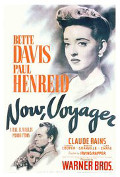
Directed by
Irving Rapper
Rated PG
Reviewed by
Bernard Hemingway

Now, Voyager
This classic melodrama is far from being a great film but it has substance and Bette Davis gives an exemplary performance as the ugly duckling who turns into a beautiful swan thanks to the power of love.
Adapted from a novel by Olive Higgins Prouty it tells the story of Charlotte Vale (Davis), spinster, who lives with her domineering mother (Gladys Cooper) in upper class Boston. She comes under the care of an avuncular psychiatrist (the perennially smooth Claude Rains), who to get her out of the clutches of her mother persuades her to go on a luxury cruise. There she meets the unhappily married Jerry Durrance (Paul Henreid) and a story of unrequited love commences for them both.
Although the film at times is technically rather rudimentary, particularly in the studio-created South American scenes, and the scenes with the Jerry’s daughter, who conveniently enables a happy ending of sorts to occur, are mawkish and overplayed, in its treatment of the necessary and transformative power of love (cue Max Steiner's lush score) it is an honest and mature film with Davis, far from being the most attractive of women superbly embodying that far-from-simple transformation.
The visual device of Jerry lighting two cigarettes and handing one to Davis is one often quoted in compiles of classic Hollywood's moments whilst her closing line to him: “Let’s not ask for the moon, we have the stars” is similarly an iconic moment in film romance, up there with Ingrid Bergman’s “Play it Sam, play “As Time Goes By” from Casablanca which waas released the same year and is a film which in its fatalistic mood shares much with this (and which also starred Rains and Henreid).
Want something different?





